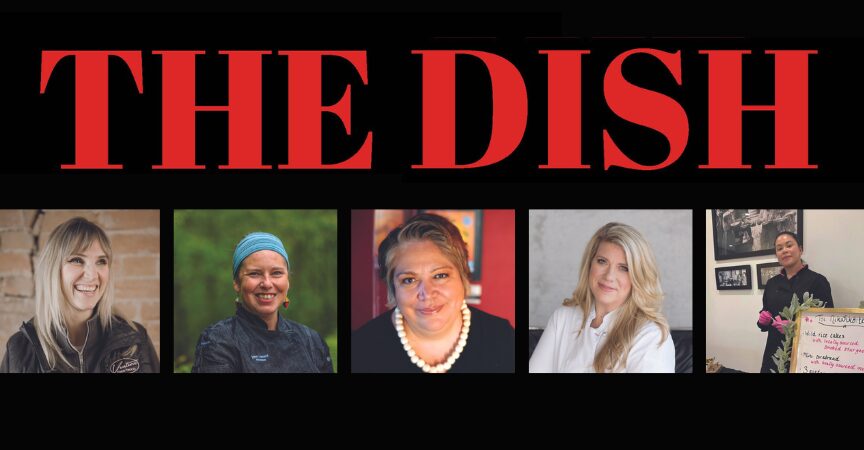The Dish
Women hospitality leaders illuminate some of the key decisions and skills that shaped their careers, and share their picks to lead the next generation.
Women make up 58 per cent of the foodservice workforce in Canada. Their entrepreneurialism and creativity have kept the industry growing and evolving, particularly during the tumultuous pandemic years. MENU recently had a chance to chat with some of the far-sighted women whose drive, engagement and leadership is currently stretching the boundaries of the sector.

ANNA LAZARE
Owner, Messy Kitchen
Kahnawà:ke, Quebec.
Instagram: @messykitchenkahnawake
In 2016, Anna Lazare and her cousin decided to turn their delicious hobby of making cakes and other baked goods into a catering business. They called it Messy Kitchen and worked out of their apartment until a commercial space became available in 2018. Moving to the larger space gave them the opportunity to expand their offering and they decided to open a restaurant, combining it with a broader catering menu.
Messy Kitchen catering recently celebrated its eighth anniversary and the restaurant its sixth. Lazare is now the sole owner. Over the years her business direction has evolved, leaving baking behind in order to concentrate more on catering and restaurant options. Although the restaurant closed for a while during COVID-19 shutdowns (it reopened in early 2022), Messy Kitchen catering carried the business through the pandemic.
Messy Kitchen offers food for a variety of tastes. Wild game and other Indigenous foods feature heavily, but are given a contemporary twist, like braised moose tacos and strawberry juice made with maple syrup. Combining the familiar with the unique is Lazare’s specialty, and her Back to Our Roots menu regularly offers new Indigenous flavours to try.
Lazare is a member of the Mohawk First Nation, and Messy Kitchen is located in the Kahnawà:ke community. Though many of her clients come from nearby Montreal, she did not register Messy Kitchen as a Quebec business. Mohawk and English are the main languages used in her community. Aware of the importance of language, Lazare elected to keep the name she had chosen rather than switch to a French name.
Studying cooking at the Pearson School of Culinary Arts in Pointe Claire first ignited Lazare’s passion for food, particularly desserts. She further honed that passion apprenticing with a donut maker. She has continued contact with Pearson, working with the school on a project with the Native Friendship Centre of Montreal (NFCM) in which she helped students prepare 3,000 meals.
MM: What’s the most important business decision you’ve ever made?
To never give up, and to keep pushing forward. The restaurant and catering business has to be one of the most unpredictable and demanding professions out there. I had a few moments where I did want to give up and quit but I didn’t. I pushed through and now I have a flourishing restaurant and catering business and I get to work with an amazing team every single day!
MM: What’s the most unusual job on your resume?
Once my team and I did catering for inmates at a prison. It was the first time for us, but it was a great experience. We were able to reconnect the inmates with their culture through food.
MM: Do you have a secret skill?
I can smell when food or baked goods are ready. No timer needed.
MM: Who would you say is an up-and-coming Canadian foodservice leader?
All the Indigenous chefs!
ALIDA SOLOMON
Chef & Owner, Tutti Matti
Toronto, Ontario
Instagram: @alidasolomon
www.tuttimatti.com

For more than two decades, Tutti Matti Ristorante Toscana has been known as the place for robust Tuscan food in downtown Toronto. At the helm is Chef Alida Solomon, who first opened her doors in 2002. After more than two decades spent serving fresh, seasonal and entirely in-house handmade Tuscan cuisine, Solomon is still going strong.
Being a chef was the only thing Solomon ever wanted to do (except for a childhood dream of being a marine biologist). She inherited a passion for food from her father, a lawyer and appreciative foodie. She studied history and geography, but after traveling with friends, Solomon became passionate about Italian food. Eventually she moved there to immerse herself in the Tuscan culinary environment.
Solomon spent more than six years working in Montalcino kitchens, from a small osteria to the Michelin-recognized Boccon di Vino. She credits her skills to the nonnas who demonstrated their methods and taught her a reverence for primary products and their provenance. When she returned to Toronto, Solomon brought her desire to share the hearty simplicity of Tuscan tastes along.
In 2002 Solomon opened Tutti Matti, with the bank as the only other investor (in fact, women bankers approved the loan). Since then, she has given Toronto unparalleled access to Tuscan cuisine, like creamy burratas paired with seasonal accompaniments, rich handmade pastas and thick and flavourful wild boar ragout. To keep her passion fresh, she makes regular return journeys to Italy, sometimes accompanied by her staff.
Her passion and commitment have earned Solomon many honours, including the Leccio D’Oro for Osteria of the year in 2009, being made a Fellow of the Institute at the Ontario Hostelry Institute’s Gold Awards in 2016, and being named Chef of the Year there in 2018. Alida makes regular appearances as a judge on Wall of Chefs, and is also co-founder of Tutti Matti Montalcino Inc, a privately owned Canadian-Italian hospitality venture.
MM: What’s the most important business decision you’ve ever made?
It’s less a decision and more an attitude: dedication. That’s what it comes down to. We’ve been open 21 years now. It’s one thing to make an entry onto the scene, but you have to stick to it to be successful. Being here every day is what makes it count.
After all, we survived the pandemic. I was here every single day, most of the time alone. If I didn’t throw in the towel then, well, I’m not going to start over and do it for someone else.
MM: What’s the most unusual job on your resume?
Picking cotton! I was 16 and on a kibbutz in Israel. After three days I asked if there was anything else I could do instead. After that, I went to work in the kitchen. It was the first place I ever cooked. Everyone had a huge breakfast, all of us together; it was the largest meal of the day. I learned how to make mayo for 400 people. That’s where I fell in love with cooking.
MM: Do you have a secret skill?
I can hang drywall. When we first built the restaurant, I was so broke I joined the construction crew. At this point, I can do pretty much anything. I’m really good at plunging toilets.
MM: Who would you applaud as an up-and-coming Canadian foodservice leader?
Chef Crae Kohne, who has been with us for six years. I’ve never seen anyone grow so much on the job. Like me, he isn’t Italian and has worked so hard to learn. He educated himself – it wasn’t just me pushing him. He’s the first chef in 21 years whose name is on the menu with mine. I have so much respect for him as a chef and a leader.

NIKI HODGSKISS
Assistant General Manager,
Venture Food Trucks
Napanee, Ontario
Instagram: @venturefoodtrucks
Niki Hodgskiss grew up in the food truck business. Her father, William Hodgskiss, had a fleet of hot dog carts. She remembers countless childhood afternoons playing under condiment tables at event grounds. After completing a degree in professional writing at York University, Hodgskiss’ entrepreneurial spirit led her to co-found The Loft Girls, a mobile fashion boutique. Today, she is the Assistant General Manager of Venture Food Trucks.
Headquartered in Napanee, Venture Food Trucks sells and custom builds mobile kitchens of every description. This includes food trucks, concession trailers, shipping container conversions and more. Venture completes almost every aspect in-house in their 32,000 sq ft manufacturing plant. With an eye to innovative and unique designs, they serve clients in both Canada and the U.S.
Her lifelong experience in the field means Hodgskiss’ view on the potential of food trucks is both wide and deep. Today’s diners are interested in a variety of cuisines, and food trucks are prepared to meet that need. Size and space constraints might mean truck menus are limited, but they can also rapidly evolve, adapting to suit any crowd or event and giving operators a chance to demonstrate their creativity and innovation.
Venture’s clients range from first-time business owners and experienced chefs to marketers expanding their ad campaign options. An entrepreneur herself, Hodgskiss understands her clients’ enterprising spirit. Venture’s website is designed to guide budding mobile operators from the rush of the first big idea through the details of design, permits, licenses and more.
Hodgskiss has watched the mobile food landscape change over the last decade. With the need for outdoor dining kicked into high gear as a result of the pandemic and reinforced by current economic volatility, cities have relaxed the permit process, allowing for a much richer, broader array of food truck options. From small vans to huge trailers and seasonal locations to special short-term pop-ups, Canada has opened up to outdoor dining, and ‘mobile’ has taken on a whole new meaning.
MM: What’s the most important business decision you’ve made?
An incredibly important business decision in recent years was to open up an American subsidiary to Venture Food Trucks called All American Food Trucks (AAFT). We launched it during the pandemic, when we were unable to attend U.S. trade shows for two years. Being unable to travel made us realize how important those trade shows were when it came to attracting American clients. AAFT filled that void for us. Today, it’s how many of the U.S. companies and organizations we build food trucks for find us.
MM: What’s the most unusual job you’ve had?
I’ve had a handful of strange jobs. I ran a mobile second-hand store, and a hot dog cart. I worked at Tim Hortons too, for years—and I loved that job! It really taught me so much about work ethic, workflow structures, people skills and more.
MM: Do you have a secret skill?
I can weld! Although you won’t see any of my craftsmanship in our food truck builds.
MM: Who would you applaud as an up-and-coming Canadian foodservice leader?
I love seeing more food companies focusing on ethical and sustainable production practices. Scout Canning is a Canadian seafood brand that really embodies this, and their tuna is so good! Their founder Chef Charlotte Langley creates and shares fantastic recipes on Instagram as well.
INEZ COOK
Owner of Salmon n’ Bannock,
Vancouver, British Columbia
Instagram: @imisky
Instagram: @salmonbannockbistro
www.salmonandbannock.net

The ‘Sixties scoop’ was a decades-long policy that saw Indigenous children forcibly removed from their homes and adopted into primarily white, middle-class families. Inez Cook considers herself one of the lucky ones. Although she was adopted away from her Nuxalk Nation family at age one, she was raised in a loving home. She developed a life-long enjoyment of good food and worked in foodservice in many different capacities from her teenage years onward.
But as she grew older, Cook recognized something was missing. She went looking for her roots, researching the food traditions and techniques of Indigenous peoples. When the Olympics came to Vancouver in 2010, Cook knew the time was right to showcase Indigenous cuisine to the world. She and Remi Cauldron opened Salmon N’ Bannock in 2010 (as of 2019, Inez is the sole owner).
Rather than choosing to highlight a specific Indigenous cuisine with Salmon n’ Bannock, Cook wanted to give people the chance to experience traditional Indigenous ingredients, meals and methods to share cultures and tell stories with food. Her pemmican mousse filters tradition through a modern lens, pairing smoked dried bison with cream cheese and blueberries.
Like many independent restaurant owners, Cook found herself doing all parts of the job: cooking, sourcing ingredients from Indigenous suppliers, and organizing both the front and back of house. These days she leaves much of the day-to-day kitchen work to her all-Indigenous staff, while she runs her expanding business. In February 2023, Inez opened Salmon N-Bannock On The Fly, the first Indigenous restaurant in a Canadian international airport.
Salmon N’ Bannock connected Cook not only with her culture, but also with her birth family. She has met hundreds of her extended relatives in the Nuxalk Nation, proving that culinary traditions can truly cross boundaries and connect lives. Inez is also the author of two children’s books, Sixties Scoop, with
Jason Eaglespeaker, and Sixties Scoop: Reconnection.
MM: What’s the most important business decision you’ve ever made?
Definitely opening Salmon N’ Bannock Bistro. It feels like Indigenous cuisine is finally getting noticed internationally.
MM: What’s the most unusual job on your resume?
I used to teach ballroom dancing. It’s not on my resume anymore, though. I have definitely forgotten how all these decades later.
MM: Do you have a secret skill?
My strangest secret skill is speaking English in different ways and accents, enough to be understood in different countries. To say things the way people of those lands would say them.
MM: Who would you applaud as an up-and-coming Canadian foodservice leader?
Chef Shane Chartrand, who was the first Indigenous chef to win gold at the Canadian Gold Medal Plates Championships. A member of the Maskêkosak people from Enoch Cree Nation, Chef Chartrand has appeared on Chopped Canada, Iron Chef Canada, and Wall of Chefs, and, with Jennifer Cockrall-King, is the author of tawâw: Progressive Indigenous Cuisine.

Jenni Lessard
Owner, Inspired by Nature
Culinary Consulting,
Lumsden, Saskatchewan
Instagram: @chefjenni
jennilessard.com
Métis chef Jenni Lessard has been a foodservice entrepreneur most of her life. Her very first venture was a snack cart called Flight Delight which she operated with friends at the La Ronge airport in Saskatchewan.
At the time, she was only 14 years old.
Her culinary enterprises continued to develop and, in 2005, Lessard opened New Ground Café in Birch Hills, which provided art space and live music in addition to a daily menu. Eight years later, she sold the building and moved to Saskatoon. She developed a business, Chef Jenni Cuisine, which offered catering, culinary speaking and teaching. Lessard was also the Chef in Residence at the Saskatoon Farmers Market from 2013 to 2016.
In 2019, Lessard became the first woman and Métis Executive Chef at Wanuskewin Heritage Park. Wanuskewin is a unique Indigenous Interpretive Centre, which offers visitors the opportunity to explore Plains cultures of the past and recognize how Saskatchewan’s Indigenous peoples are represented today. As culinary expert and chef for the Han Wi dinner series, Lessard has created an experiential dining adventure that is both celebration of and education about Northern Plains culture.
Lessard started Inspired by Nature Culinary Consulting after leaving Wanuskewin Heritage Park during the pandemic and moved to the Qu’Appelle Valley near Regina. If life as a visionary chef and culinary consultant was not enough, Lessard also served on the Slow Food Saskatoon steering committee and as Vice-President of Métis Local 126. Currently, Lessard is the interim Executive Director of the Indigenous Culinary of Associated Nations (ICAN).
MM: What’s the most important business decision you’ve ever made?
I bought my restaurant building when I expanded from a rented, 14-seat coffee shop into a 36-seat space with room for art and live music. This was made possible with help from the Clarence Campeau Development Fund, which supports Métis entrepreneurs, and by my local credit union.
Now, almost 20 years later, the real estate situation is far more difficult for new businesses to navigate, but the sale of that building financed my move to Saskatoon and the start-up of my catering company. If you can find a way to own the building in which your business is located, you’ll have more security, an investment and an incentive to work even harder.
MM: What’s the most unusual job on your resume?
My first contract with Inspired By Nature Culinary Consulting was with the Saskatchewan Health Authority, creating patient menus using local and Indigenous ingredients for the Jim Pattison Children’s Hospital in Saskatoon. I was recovering from COVID-19 and had to wait a couple extra weeks to start recipe testing, until my taste and smell returned.
My husband was my test subject, and he did his best to answer questions like, “If you were a four-year-old having trouble swallowing, would this roasted carrot and sunflower seed purée in the shape of a sunflower make you feel better?”
MM: Do you have a secret skill?
I can nap anywhere, anytime. As a teenager, I worked for my uncle at his fruit stand in Jasper, Alberta and after a 12-hour day there would often be a train blocking my path home. I’d toss my backpack on the ground for a pillow and get a satisfying 15 minutes of sleep while the earth shuddered, and the bells clanged. Great training for future chef/restaurateur cat naps!
MM: Who would you applaud as an up-and-coming Canadian foodservice leader?
I had the opportunity to work with an incredibly creative and talented young person named Phoenix Isnana at their high school’s food and tourism pathways program and at the first-ever Northwest Territories Culinary Festival in Yellowknife in July 2023.
Phoenix is from the Zagime Anishinabek Saulteaux Nation with ties to Standing Buffalo First Nation. They have plans for a sweets business using Indigenous ingredients to sell at pow wows and eventually in a retail setting. I’ve taught Phoenix a few things that might smooth their foodservice path, but I’m in awe of their wisdom and foresight. I think the new generation of cooks, chefs and food producers will be more successful at work-life balance and setting boundaries.
March 8, 2024 is International Women’s Day (IWD). This aim of this year’s theme, #InspireInclusion is to collectively forge a more inclusive world for women. Visit internationalwomensday.com for more information.









